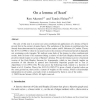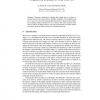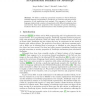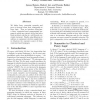632 search results - page 42 / 127 » Combining programming with theorem proving |
118
Voted
JCT
1998
15 years 2 months ago
1998
The aim of this note is to point out some combinatorial applications of a lemma of Scarf, proved first in the context of game theory. The usefulness of the lemma in combinatorics...
163
Voted
ERSHOV
2009
Springer
15 years 6 months ago
2009
Springer
A term t is called a template of terms t1 and t2 iff t1 = t1 and t2 = t2, for some substitutions 1 and 2. A template t of t1 and t2 is called the most specific iff for any template...
114
Voted
ESOP
2007
Springer
15 years 9 months ago
2007
Springer
Abstract. This paper contributes a technique that expands the set of object invariants that one can reason about in modular verification. The technique uses history invariants, tw...
130
Voted
APLAS
2008
ACM
15 years 4 months ago
2008
ACM
We define a small-step operational semantics for the ECMAScript standard language corresponding to JavaScript, as a basis for analyzing security properties of web applications and ...
101
Voted
AAAI
1992
15 years 4 months ago
1992
We define fuzzy constraint networks and prove a theorem about their relationship to fuzzy logic. Then we introduce Khayyam, a fuzzy constraint-based programming language in which ...




